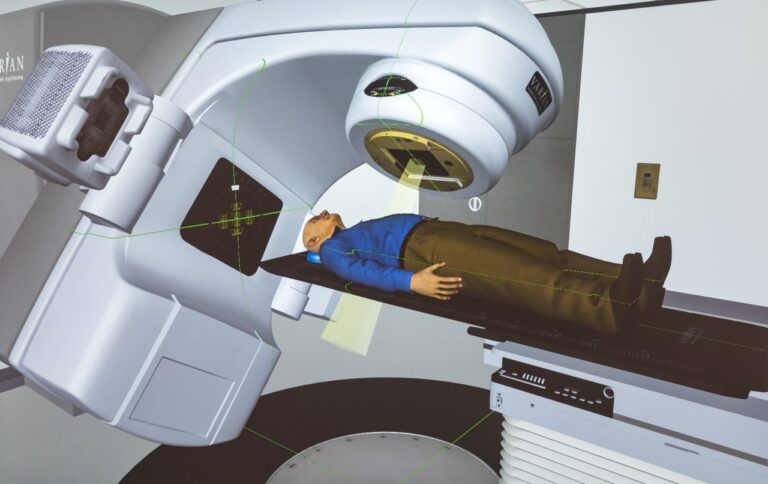
WINTERVILLE, N.C. — Pitt Community College students preparing for radiation therapy careers are using state-of-the-art virtual technology to practice the delivery of ionizing radiation used in the treatment of cancer and other diseases.
Last year, the college purchased a Virtual Environment Radiotherapy Training (VERT) system that creates a life-size, 3D setting for students to hone their skills with various types of linear accelerators. The technology allows them to position virtual patients and equipment and visualize radiation beams passing through the body with pinpoint accuracy to destroy cancerous tumors while sparing healthy surrounding tissue.
“VERT provides students a better understanding of treatment setups and constraints prior to beginning their clinical education,” says Elaine Spencer, director of PCC’s Radiation Therapy and Medical Dosimetry programs. “As a result, it decreases the transition time students need to orient themselves to the clinical environment and makes them more knowledgeable and marketable in the workplace after graduation.”
Through rear-projection technology, VERT produces a simulated radiation therapy treatment room equipped with fully functional, realistic models of linear accelerators, as well as table and gantry controls. Students wear special 3D goggles to prepare patients for treatment and practice radiation therapy procedures.
“The VERT software package features real patient data to allow students to become familiar with all of the various anatomical treatment setups and the planning involved with each one,” Spencer said. “Another exciting feature is that you can zoom in and see inside the virtual patient, which you could obviously never do with a real-life patient.”
Although VERT technology has been around more than a decade and offers exclusive technologies, it’s not widely seen in radiation therapy programs across the nation. In fact, Spencer said Forsyth Community College is the only other North Carolina community college to have it.
“Forsyth has had VERT for several years now and has been very impressed with the technology and the advantage it gives students,” she said. “Being able to safely train students on Varian IX, Elekta and Varian True Beam linear accelerators not only prepares them for the clinical setting but gives them an advantage when seeking employment.”
Spencer said PCC installed its VERT system in January 2021, a process that required significant classroom modifications.
“The room had to have specific requirements,” she said. “For instance, the walls had to be painted a dark gray to allow for better visualization of the 3D images that project on the screen. The screen had to be placed on a specific wall, which required the white board to be moved. Tables had to be rearranged, and there were computer lines and electrical upgrades that had to be completed.”
Though everything was in place early last year, Spencer said the college could not use its VERT system until the 2022 Spring Semester. She explained that the pandemic prevented the VERT application specialist in the United Kingdom from traveling to the U.S. to train PCC faculty.
PCC Health Sciences Dean Donna Neal said while it may have been a bit of a headache to set up VERT and train faculty how to use it, the technology was a long time coming and well worth the time and effort.
“This is something the program has wanted for years — virtual reality training with the special 3D goggles and all,” she said. “It may not appear quite as exciting as our simulation hospital, but it’s just as impressive in terms of what can be done with it and its benefit to our Radiation Therapy students.”
Spencer said even though her current students have had limited experience with VERT, they’ve been impressed with what they’ve seen thus far.
“They have been amazed at how real the experience is when viewing the 3D screen and watching the linear accelerator as it moves around the patient,” she said. “It has also given them a better understanding of the close proximity between the tumor they are treating and the normal structures surrounding it.”
Prior to VERT’s arrival, PCC students trained on linear accelerators in clinical training settings while patients were being treated in real-time. Oftentimes, therapists were far too busy to give the students detailed instruction on how to safely treat patients with radiation.
“The VERT system has the capability of simulating the main types of linear accelerators used in all 21 of our clinical facilities, and the simulation of the linear accelerator mechanics are exactly like what students see in the clinics,” Spencer said. “Another significant advantage of the VERT system is they get to see various types of equipment rather than just the one used at their respective clinical training site.”
PCC’s Radiation Therapy Technology curriculum prepares students to work with nurses, physicists and physicians to administer prescribed doses of ionizing radiation for the treatment of disease, primarily cancer. It has several entrance requirements, including completion of a radiography degree program and American Registry of Radiologic Technologists (ARRT) certification in radiography.
Students who complete PCC’s 44-credit diploma in radiation therapy may be eligible to sit for the National Radiation Therapy Exam administered by ARRT.
Late-Start Summer Classes Begin June 8
Summer semester is underway at PCC, but there’s still an opportunity for prospective students to enroll in classes.
According to PCC Assistant Vice President of Curriculum and Instruction Lori Preast, seats are available for individuals interested in taking late-start classes. The college, she explained, will offer a host of eight-week courses that run from June 8 to Aug. 3. Though most will be taught online, some, including a pair of ceramics classes at the GlasStation in Farmville, will take place in the traditional classroom setting.
New students interested in taking classes are asked to contact the PCC Student Hotline at (252) 493-7245, Monday through Thursday, between 8 a.m. and 5:15 p.m., and Friday, between 8 a.m. and 1 p.m.



